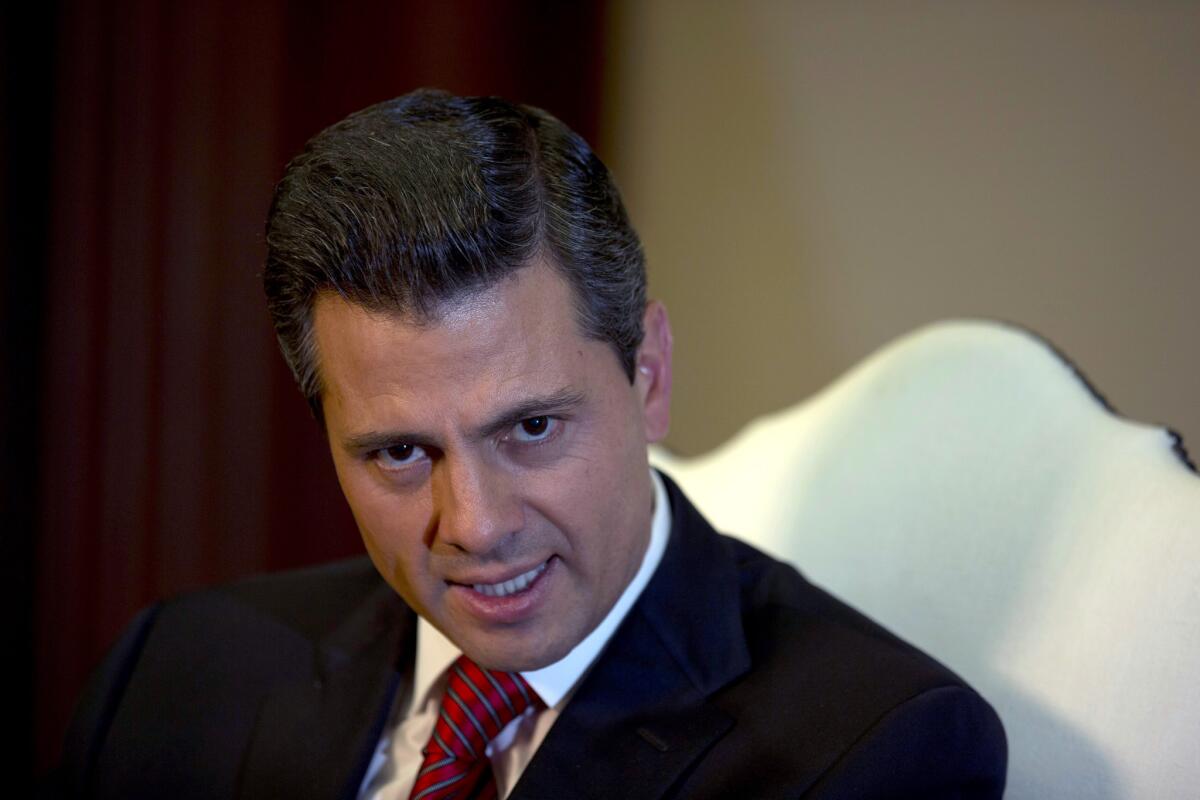Mexican President Pena Nieto postpones landmark Pemex bill

MEXICO CITY -- In a sign of how difficult his task is, Mexican President Enrique Peña Nieto announced Wednesday that he has postponed presentation of a landmark bill that would open Mexico’s energy sector to private investment.
The president said on his Twitter account that he would submit the legislation to Congress next week, adding that he was continuing to prepare it amid reports of last-minute hitches, tweaks and complaints from opponents.
The much-anticipated reform would require changes in the Mexican Constitution and, in its most important elements, would end the state monopoly that Petroleos Mexicanos, or Pemex, has had on virtually all oil and gas exploration and production in the country for 75 years.
As recently as Tuesday, in a public speech, the president had said he intended to unveil the sweeping reform measure this week, and he had previously mentioned Wednesday as the likely day.
Peña Nieto’s top Cabinet point men met Tuesday evening with leaders of the main political parties, whose support the government needs for the reform to prosper. Peña Nieto’s Institutional Revolutionary Party, under which the oil industry was first nationalized in 1938, does not by itself have enough votes to change the constitution. The right-wing National Action Party (PAN) appears to be onboard, but the leftist Democratic Revolution Party (PRD) is balking.
And Andres Manuel Lopez Obrador, veteran leftist leader who has split with the PRD but was its presidential candidate, called a major rally for next month to protest what he called the privatization of Pemex, a move he labeled treason.
Peña Nieto argues that “transformational” change in Pemex will provide a huge boost to the Mexican economy and halt the oil giant’s steady decline in production by making it more efficient and enabling it to explore abundant but untapped crude reserves in hard-to-reach deep water.
But generations of Mexicans have been raised on the idea that Pemex embodies a national identity based on fierce independence from foreign intervention.
Other Mexicans, however, simply don’t trust the government to oversee what promises to be a formidable injection of foreign capital. They remember the privatization of the state phone company in the 1990s, also under a PRI administration that, by all accounts, was rife with corruption. That led to today’s arrangement whereby most phone connections are controlled by one company (belonging to tycoon Carlos Slim), which offers poor service and charges some of the highest rates in the developed world.
“In a system incapable of redistributing wealth but capable of producing many millionaires, who wants to give more advantages to the system’s biggest winners?” political consultant Roberto Trad wrote in a column for the Animal Politico news website, where he argued that the public was a long way from accepting Pemex reform. “We see in our daily lives how a handful advances and gets rich very fast, while others stay behind and the middle class, little by little, disappears.”
Other experts argue that no reform will be possible without breaking the stranglehold of the notoriously corrupt Pemex labor union, which has traditionally been a backbone of PRI support.
ALSO:
Iran’s new president prompts renewed Israeli threats
Symbolic dates and Yemen strike drive fears of Al Qaeda attack
China fines baby formula companies $108 million in price-fixing case
wilkinson@latimes.com
More to Read
Sign up for Essential California
The most important California stories and recommendations in your inbox every morning.
You may occasionally receive promotional content from the Los Angeles Times.











